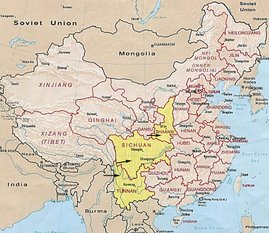I've recently become good friends with a Chinese English teacher at our school. She and I have spent a couple of Saturdays together; this past weekend, we went bowling and had dinner. Her English is excellent, and we were able to carry on a very interesting conversation. Throughout the course of the evening, it came up that her works in Internet censorship at the local police bureau. According to my friend, "he searches the Internet for information that is not safe for the country" by monitoring Internet cafes for people who are looking at pornography.
Enter any Internet cafe in Zhanjiang and you're bound to see several young men viewing sexually explicit material online, and making no attempt at discretion. The English online version of the state-run news, China Daily, claims that the education system is partly responsible for the trend towards Internet porn. One article quotes a Shanghai student, "Porn websites are rooted in young people who are thirsty for the facts of life, on which education is so deficient in the nation."(1) Lack of sexual and ethical education in schools often leads to confusion and immaturity about relationships.
A myriad of extremely rapid social changes have accompanied economic development in China. It's the year 2008, but the country is just now experiencing its industrial revolution as well as the side-effects of a huge economic boom taking place in a short period of time. While traditional romantic relationships are extremely conservative, more and more young people are moving out of their villages to East coast boomtowns such as Shenzhen and Guangzhou to pursue their fortunes independent of family ties.
Away from the rigor of hometown life, recent graduates are free to do as they wish. However, as mentioned above, innocence of "the facts of life" is encouraged during high school and college. Many colleges prohibit students from dating or socializing much with the opposite sex. Students go from an isolated village to a college environment in which normal interaction between the sexes is discouraged. At the mention of the word "boyfriend," my college students are instantly reduced to giggles! After graduation- at which point they are none the wiser about relationships- students emigrate to modern cities of 10+ million people and are immediately expected to become adults and function in the "real world."
Another problem that is confounding traditional male-female relationships in China is the One-Child Policy. Instituted in 1979, the policy attempts population control by heavily fining any family with more than one child. The rule is focused on heavily populated urban areas. There are exceptions; for example, minorities (non-Han Chinese) are exempt, and those in rural areas are permitted a second child if the first is disabled or a girl. Yes. Disabled or a girl. Needless to say, sons are much preferred to daughters. That means that if a woman in an urban area knows she's about to give birth to a girl, she has a very high financial incentive to abort her daughter and try again for a boy.
According to the CIA World Factbook, the current male/female birth ratio is 1.11; the under- 15 male/female ratio is 1.13 (compare to the U.S. and U.K. rates of 1.05 in both categories). (2, 3)The result is a serious deficiency of females; for many young men, a relationship with a Chinese woman is just not an option. At my school, far too many teenage boys react to this discrepancy by behaving like hooligans. They compensate for their innate insecurity with buffoonery: harassing any girl who walks by (foreign or Chinese); wearing their hair in the "finger in the electrical socket" style; and refusing to take part in academic studies or better themselves in any way. All teachers dread a class full of boys, and for good reason! The female students, on the other hand, are almost universally attractive, respectful, and diligent in their studies.
(1) http://english.people.com.cn/200408/01/eng20040801_151461.html
(2)https://www.cia.gov/library/publications/the-world-factbook/geos/ch.html
(3) https://www.cia.gov/library/publications/the-world-factbook/geos/uk.html
Tuesday, May 13, 2008
Boys & Girls
发表者
Janet
位置在:
10:22 PM
![]()
Subscribe to:
Post Comments (Atom)


No comments:
Post a Comment